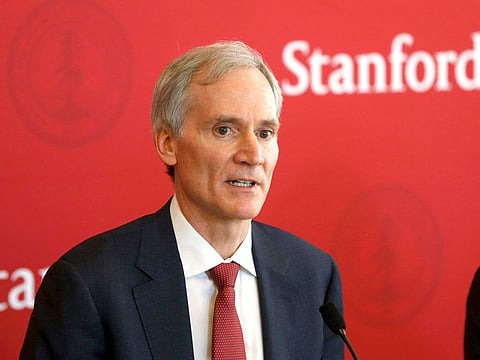Stanford University President quits after problems discovered in his research
Initial questions over his research were raised by the university's student newspaper

Stanford University President Marc Tessier-Lavigne is resigning after months of scrutiny over flaws in his scientific research, sparked by a teenage student's investigation.
A review, conducted by a special committee that included a former federal judge, didn't find evidence that Tessier-Lavigne engaged in "fraud or falsification of scientific data," but it uncovered instances of manipulation of research data by members of his lab, according to a letter Tessier-Lavigne sent on Wednesday.
"I should have been more diligent when seeking corrections, and I regret that I was not," he wrote. "The panel's review also identified instances of manipulation of research data by others in my lab. Although I was unaware of these issues, I want to be clear that I take responsibility for the work of my lab members."
'Will correct or retract research'
Tessier-Lavigne, a neuroscientist who joined Stanford as president in 2016 from Rockefeller University in New York, has been a leader in the field of brain and spinal cord research. His work has focused on the cause and treatment of degenerative diseases such as Alzheimer's and Parkinson's, as well as developing therapies for spinal cord injuries. Prior to Rockefeller he worked as chief science officer for Genentech Inc.
Initial questions over his research were raised by the university's student newspaper, the Stanford Daily, led by student journalist Theo Baker, who won a George Polk award for his stories.
"This shows that our reporting contributed to the correction of the scientific record for five widely-cited papers and I see that as a real indication of the power of independent student media to raise concerns to light," Baker said in a message over Twitter.
Last December, a special committee of Stanford's Board of Trustees initiated a review into allegations of misconduct related to Tessier-Lavigne's research and papers he authored or coauthored. Tessier-Lavigne said he will retract or correct five of his papers as a result of the review.
Interim president
Tessier-Lavigne's resignation will take effect at the end of August and he will remain on the Stanford faculty. The university's board of trustees, led by Yahoo co-founder Jerry Yang, said Professor Richard Saller would become interim president in September.
Saller, whose research interests are ancient history and classical archaeology, told Bloomberg that because it's an interim appointment, "it would be presumptuous to have grand plans."
"I intend to continue the work of Marc Tessier-Lavigne and several of his initiatives."
Tessier-Lavigne was a prolific fundraiser for the university among contacts in Silicon Valley, including the Stanford Doerr School of Sustainability, funded with a $1.1 billion gift from venture capitalist John Doerr in 2022.
The Palo Alto-based university has had enormous success in the past decades fueled by its ties to Silicon Valley, selectivity in undergraduate admissions and eminent research, including 20 living Nobel laureates. Its endowment has grown to more than $36 billion and in some years fundraising has eclipsed Harvard University, the country's richest and oldest college.
In recent years, Stanford's name has also been dragged into various scandals, including former student Elizabeth Holmes, who dropped out to found Theranos. Law school professors, Joseph Bankman and Barbara Fried, meanwhile are the parents of FTX founder Sam Bankman-Fried.



